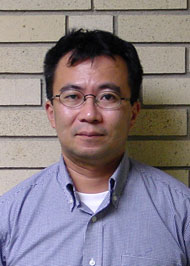Yoshiro Sohma, MD, PhD
Research Interests
Structure-function studies of ion channels/transporters, molecular patho-physiology of ion channels/transporters, epithelial transport
Research Description
Sohma studies the permeation and gating of a large-conductance, Ca2+-activated, voltage-dependent potassium (BKCa ) channel. BKCa channels are ubiquitously expressed in many different tissues and are known to be sensitive to membrane potential, intracellular calcium, magnesium and pH. These channels are also activated by CO and sensitive to O2 associated with hemeoxygenase-2 and, moreover, some slice-variants respond to membrane stretch. Based on these findings, BKCa channels are suggested to play an important role in integrating cell signals, a recently proposed new function of an ion channel.
Sohma is also involved in a Japanese-based collaborative project undertaking a comprehensive study of the GABAergic system in peripheral tissues (not the central nervous system) and work on GABAA receptor channels and GABAB-mediated modulation of K+ and Ca2+ channels in peripheral tissues.
Sohma studies the molecular mechanism of gating and permeation of the CFTR chloride channel, a member of the ATP-Binding Cassette (ABC) transporter superfamily, in collaboration with Dr. Tzyh-Chang Hwang. Our work has made a significant contribution to the recent advances in the biophysical understanding of the ATP-dependent gating mechanism in CFTR, and has provided great insight into a possible common functional mechanism that can be applied to the whole ABC transporter superfamily. The structure of the membrane spanning domain (MSD) in CFTR is known to be similar to that in the P-glycoprotein drug efflux pump. Understanding MSD structure/function in CFTR may lead to a better understanding of multi-drug resistance (MDR) proteins.
In addition to investigating the biophysics of the CFTR molecule itself, Sohma is also interested in studying the functional interactions of CFTR with other membrane proteins and lipids. This should help in the understanding of the complicated regulatory mechanisms that underlie physiological functions in cell membrane. I have also employed computer modeling to simulate ion transport processes in epithelial cells (e.g., bicarbonate transport in pancreatic duct cells). This approach is very useful to bridge information from molecular biophysics and cell/tissue physiology to the research field of epithelial transport.
Sohma believes that by taking such a general and comprehensive approach to the study of different channels/transporters and channel/transporter-mediated physiological systems, a “positive cooperative effect” which accelerates each research project, and provides a novel scientific standing point of view for the channel sciences.
Professional Background
Obtained PhD and MD from Osaka Medical College, Japan.
Selected Publications
- Cai Z, Sohma Y, Bompadre SG, Sheppard DN, Hwang TC, Application of high-resolution single-channel recording to functional studies of cystic fibrosis mutants., Methods Mol Biol. 2011;741:419-41.PMID: 21594800
- Yu YC, Miki H, Nakamura Y, Hanyuda A, Matsuzaki Y, Abe Y, Yasui M, Tanaka K, Hwang TC, Bompadre SG, Sohma Y., Curcumin and genistein additively potentiate G551D-CFTR., J Cyst Fibros. 2011 Jul;10(4):243-52. Epub 2011 Mar 26., PMID: 21441077
- Kopeikin Z, Sohma Y, Li M, Hwang TC.,On the mechanism of CFTR inhibition by a thiazolidinone derivative., J Gen Physiol. 2010 Dec;136(6):659-71. Epub 2010 Nov 15.PMID: 21078867
- Shimizu H, Yu YC, Kono K, Kubota T, Yasui M, Li M, Hwang TC, Sohma Y., A stable ATP binding to the nucleotide binding domain is important for reliable gating cycle in an ABC transporter CFTR., J Physiol Sci. 2010 Sep;60(5):353-62. Epub 2010 Jul 14.PMID: 20628841
- Tsai MF, Shimizu H, Sohma Y, Li M, Hwang TC., State-dependent modulation of CFTR gating by pyrophosphate., J Gen Physiol. 2009 Apr;133(4):405-19.PMID: 19332621




